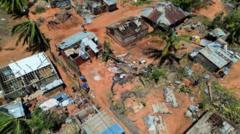The catastrophic impact of Cyclone Chido, which made landfall with winds reaching 260 km/h and heavy rains, has led to significant casualties and damage in Mozambique. The National Institute of Risk and Disaster Management (INGD) reported that besides the fatalities, around 768 individuals sustained injuries, and over 622,000 people were affected across various regions.
Originating from the French Indian Ocean territory of Mayotte, Cyclone Chido first unleashed its fury there before progressing to the mainland, heavily impacting Mozambique, Malawi, and Zimbabwe. In Mozambique, the northern provinces, which are regularly vulnerable to cyclones, felt the brunt of the storm. Cabo Delgado was particularly hard-hit, with the cyclone then advancing into Niassa and Nampula.
The repercussions of the cyclone on the education and health sectors have been alarming, with over 109,793 students affected due to substantial damage to school infrastructure. The health system also suffered as 52 sanitary units were reported damaged, particularly concerning in regions where access to healthcare was already limited.
In response to the disaster, Daniel Chapo, the leader of Mozambique's ruling party, stated that the government is mobilizing comprehensive support efforts to assist those affected in several provinces, including Mecúfi, Nampula, Memba, and Niassa.
Mayotte, where Chido first struck, experienced one of its most devastating storms in 90 years, resulting in 35 confirmed fatalities so far, with concerns that this number may rise as assessments continue. Local officials warn of potentially significant increases in the death toll as recovery efforts unfold; over 1,300 personnel have been deployed to assist.
One week after the cyclone, residents in Mayotte are still grappling with a lack of basic necessities, although reports indicate that running water is slowly being restored. The French interior ministry has been active in delivering aid, with 80 tonnes of food and 50 tonnes of water distributed recently.
The devastating results of Cyclone Chido serve as a stark reminder of the urgent need for adaptive strategies to enhance the resilience of communities to climate-related disasters. The cyclone exemplifies the vulnerability of infrastructure to extreme weather events, with climate change playing a contributory role in the severity of such storms.
Tropical cyclones, noted for their destructive winds and flooding potential, continue to be associated with rising global temperatures, as corroborated by reports from the Intergovernmental Panel on Climate Change (IPCC). The findings underscore the correlation between human activity and the intensification of storms.
This latest disaster reinforces the ongoing discourse surrounding climate change and its implications for extreme weather patterns, calling for improved preparedness and robust infrastructure planning to mitigate future climate risks.
Originating from the French Indian Ocean territory of Mayotte, Cyclone Chido first unleashed its fury there before progressing to the mainland, heavily impacting Mozambique, Malawi, and Zimbabwe. In Mozambique, the northern provinces, which are regularly vulnerable to cyclones, felt the brunt of the storm. Cabo Delgado was particularly hard-hit, with the cyclone then advancing into Niassa and Nampula.
The repercussions of the cyclone on the education and health sectors have been alarming, with over 109,793 students affected due to substantial damage to school infrastructure. The health system also suffered as 52 sanitary units were reported damaged, particularly concerning in regions where access to healthcare was already limited.
In response to the disaster, Daniel Chapo, the leader of Mozambique's ruling party, stated that the government is mobilizing comprehensive support efforts to assist those affected in several provinces, including Mecúfi, Nampula, Memba, and Niassa.
Mayotte, where Chido first struck, experienced one of its most devastating storms in 90 years, resulting in 35 confirmed fatalities so far, with concerns that this number may rise as assessments continue. Local officials warn of potentially significant increases in the death toll as recovery efforts unfold; over 1,300 personnel have been deployed to assist.
One week after the cyclone, residents in Mayotte are still grappling with a lack of basic necessities, although reports indicate that running water is slowly being restored. The French interior ministry has been active in delivering aid, with 80 tonnes of food and 50 tonnes of water distributed recently.
The devastating results of Cyclone Chido serve as a stark reminder of the urgent need for adaptive strategies to enhance the resilience of communities to climate-related disasters. The cyclone exemplifies the vulnerability of infrastructure to extreme weather events, with climate change playing a contributory role in the severity of such storms.
Tropical cyclones, noted for their destructive winds and flooding potential, continue to be associated with rising global temperatures, as corroborated by reports from the Intergovernmental Panel on Climate Change (IPCC). The findings underscore the correlation between human activity and the intensification of storms.
This latest disaster reinforces the ongoing discourse surrounding climate change and its implications for extreme weather patterns, calling for improved preparedness and robust infrastructure planning to mitigate future climate risks.





















